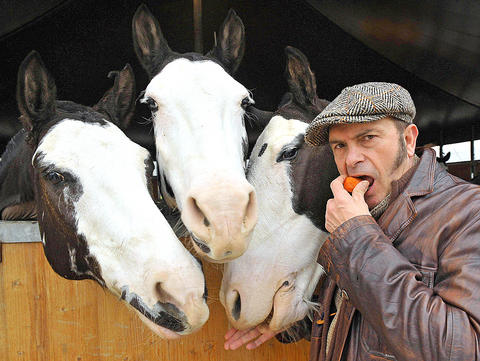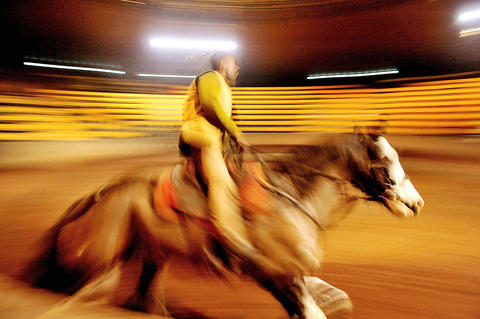Bartabas, enigmatic visionary behind one of the world's most spectacular circuses, says his latest equestrian extravaganza is a celebration of life that transcends nationality, religion and race.
The show - in which 36 horses and their riders gallop around an arena for 90 minutes of fast-paced, acrobatic and comic story-telling - is a showcase, he says, for his philosophy of tolerance.
The theme is in the show's name: Battuta - a term he created from a combination of words cherry-picked from his native French, Romanian and Romany which he says aims to convey the energy and beauty of Gypsy music.

PHOTO: AFP
"I went to Romania and I was very surprised to see how these people (Gypsies) are treated," said Bartabas, who is known only by his stage name.
"In Europe they are outsiders, even though more than 20 years ago, people in Europe were talking about open borders. But we don't accept that people live differently, because their values are different."
Sitting in the stalls of the four-pointed tent erected on the northern shore of Hong Kong harbor in which the show takes place, Bartabas said this latest production by his company Zingaro - Gypsy in Italian - continues a tradition of drawing inspiration from a variety of cultures and lifestyles.

PHOTO: AFP
"It is a very important idea for Zingaro, to be able to live with people of all religions, nationalities and philosophies," he said.
"They come and live with us," he says of Zingaro's performers and musicians who hail from across Europe.
"We live always in the theater - not because we are a family of gypsies, but because we need to live with the horses and live together. The idea is that we have to learn from one another."
Bartabas is regarded in Europe as an almost mythical figure because he insists on using his stage name only, and stories abound of his origins stretching from Romania to Rajasthan.
A day in the life of a gypsy family
But as he watches riders exercise two of the 38 horses who arrived in Hong Kong aboard two Boeing 747 jets, he says there is no mystery about him.
"I come from outside Paris, my father was an architect, I did not grow up riding, but I was always fascinated by horses and I followed many disciplines - racing, dressage, bullfighting, jumping - before I came to this."
From his base near Versailles, Bartabas has built an equestrian academy, with support from the French government, where he trains horses and riders and creates his narrative spectacles.
The current show, which has been thrilling Hong Kong audiences since early last month, took three years to perfect, he says.
It portrays a day in the life of a Gypsy community, beginning with the breaking of camp at dawn through a rambunctious series of events from women fighting over stolen washing, to a young bride eloping with her lover, being chased and brought home by her irate father and brothers - all on horseback.
Two Gypsy orchestras - a brass ensemble from Moldova and fiddlers from Transylvania - provide a jolly, pace-setting soundtrack to the breathtaking acrobatics.
Riders perform somersaults, headstands and stripteases on horseback; they dance, ride two horses at once and swap mounts mid-stride; one rider makes her horse skip in double-time; another leaps on and off a cantering draft horse.
A gang of youths show off to each other by throwing their hats on the ground and picking them up again, all the while maintaining a frenetic gallop, standing in their saddles, beating their chests and shouting at each other like young men hanging out on street corners the world over.
The pace never wanes - and Bartabas described Battuta as the most ambitious show he has produced since Zingaro was established in 1984.
"Now I'm working a lot on the energy and physical impact," he said. "It is not an intellectual show - it gets your heart first, and then your head. I have no text, there's no reason for me to use language."
"I don't make the performance to show the horses - I want to show the reaction and relationship between man and horse. The way you are with the horse is the way you are with others," he added.
"The horse gives you back what you give - like a Stradivarius," he said, referring to the rare violins made by the Italian Stradivari family in the late 17th and early 18th centuries.
"If you teach him the language of love and sensuality and sensibility, you will get it back."
Spectacular acrobatics
The logistics of Battuta are head-spinning - the 38 horses, which include two standbys in case any are injured during training or performing, eat about 17kg of food each a day, or a daily total of around 640kg.
They follow a strict diet of straw and mixed cereals served at intervals, including a supper of hay after the show. They snack on a total of 25kg of carrots a day and bed down on wood shavings that over the course of their two months in Hong Kong will amount to 23,200kg.
They are exercised for at least an hour each day to make sure they stay in peak fitness for the furious pace of the show, are put to bed at 10pm each night and woken with breakfast at 7am.
Each horse performs for a total of about 15 minutes, appearing several times during the show - running free, performing acrobatics and pulling carts.
The show runs in Hong Kong until March 23. Bartabas said he plans to take Battuta to Moscow, Tokyo, Sao Paulo and Brussels.

On April 26, The Lancet published a letter from two doctors at Taichung-based China Medical University Hospital (CMUH) warning that “Taiwan’s Health Care System is on the Brink of Collapse.” The authors said that “Years of policy inaction and mismanagement of resources have led to the National Health Insurance system operating under unsustainable conditions.” The pushback was immediate. Errors in the paper were quickly identified and publicized, to discredit the authors (the hospital apologized). CNA reported that CMUH said the letter described Taiwan in 2021 as having 62 nurses per 10,000 people, when the correct number was 78 nurses per 10,000

As we live longer, our risk of cognitive impairment is increasing. How can we delay the onset of symptoms? Do we have to give up every indulgence or can small changes make a difference? We asked neurologists for tips on how to keep our brains healthy for life. TAKE CARE OF YOUR HEALTH “All of the sensible things that apply to bodily health apply to brain health,” says Suzanne O’Sullivan, a consultant in neurology at the National Hospital for Neurology and Neurosurgery in London, and the author of The Age of Diagnosis. “When you’re 20, you can get away with absolute

When the South Vietnamese capital of Saigon fell to the North Vietnamese forces 50 years ago this week, it prompted a mass exodus of some 2 million people — hundreds of thousands fleeing perilously on small boats across open water to escape the communist regime. Many ultimately settled in Southern California’s Orange County in an area now known as “Little Saigon,” not far from Marine Corps Base Camp Pendleton, where the first refugees were airlifted upon reaching the US. The diaspora now also has significant populations in Virginia, Texas and Washington state, as well as in countries including France and Australia.

May 5 to May 11 What started out as friction between Taiwanese students at Taichung First High School and a Japanese head cook escalated dramatically over the first two weeks of May 1927. It began on April 30 when the cook’s wife knew that lotus starch used in that night’s dinner had rat feces in it, but failed to inform staff until the meal was already prepared. The students believed that her silence was intentional, and filed a complaint. The school’s Japanese administrators sided with the cook’s family, dismissing the students as troublemakers and clamping down on their freedoms — with